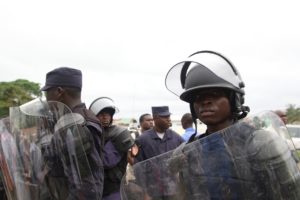Blog
Militaries and Health Crises: Militarising Global Health?
Written by Adam Kamradt-Scott
August 3, 2018
The 2014 West African Ebola outbreak was a devastating event that killed over 11,300 people. It decimated entire communities, leaving the worst-affected countries – Guinea, Liberia and Sierra Leone – struggling to rebuild economies and restore public services. The outbreak was also significant for another reason. It was the first time foreign militaries were deployed en masse to deal with an infectious disease outbreak.
Militaries and disaster response
Militaries have long been involved in providing humanitarian assistance and disaster relief (HADR) in response to natural disasters like earthquakes, floods and tsunamis. While humanitarian actors have cautiously welcomed their assistance during these types of crises, military involvement in health-related activities has generally been regarded as a step too far. Health assistance, some groups argue, blurs the boundaries between humanitarians and military personnel, making the former potentially legitimate targets. The notable upsurge of attacks on healthcare facilities over the last decade, along with the kidnapping and murder of polio eradication workers, seem to validate these concerns.
To be fair, most soldiers are arguably not thrilled by the prospect of being deployed to an infectious disease ‘hot zone’, preferring an enemy they can see over the microbial world. Some of the militaries involved in responding to Ebola though have indicated they now consider dealing with disease outbreaks part of their wider HADR responsibilities. Several governments too have suggested they are more willing to deploy military personnel in future disease outbreaks.
A dangerous precedent
For many within the humanitarian and development communities, the use of military personnel in containing disease outbreaks like Ebola and Zika has created a dangerous precedent that must be resisted. There are legitimate concerns about what may happen, how military personnel might be used, and what it might mean for development workers ‘on-the-ground’ after the military have packed up and left.
What is clear is that infectious disease outbreaks are becoming more frequent, not less. In many countries that lack adequate healthcare facilities and health workers, this presents a problem. Faced with an existential crisis, it is understandable that governments might use whatever means at their disposal to save lives. It is also clear that in many parts of the world, militaries are not the last resort, they are the only resort at governments’ disposal.
Looking ahead
To date, the international community lacks sufficient guidelines for reasonable activities, tasks, and functions of militaries in health emergencies. We also need clear lines in the sand for what militaries should not do.
While some may wish to simply resist the use of militaries in health emergencies, proverbially burying our heads in the sand while militaries are deployed may not be the best approach. We need all members of the development community to help work out where the lines of responsibility rest. In short, we need to engage and do so now as the next outbreak is probably just around the corner.
Adam Kamradt-Scott is currently leading an international research project examining the role of militaries in health emergencies. Read more about this work here or visit the survey here.

